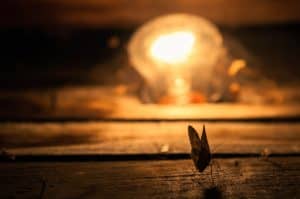Do not go into artificial light,
Our lamps can bring an end to fragile life;
Fly, fly away into the shrouded night.
Your passion like a candle burns too bright,
And danger lurks in shadows like a knife;
Do not go into artificial light.
We harvest you from town and rural site,
To observe where obsession is most rife;
Fly, fly away into the shrouded night.
Your urban comrades seem to have less flight,
They have evolved to recognise the strife;
Do not go into artificial light.
You’ve learnt to fear what once brought such delight,
Husbands, please take the lead of your good wife;
Fly, fly away into the shrouded night.
And whilst if you don’t go you’ll be alright,
Your absence will affect plant and wildlife.
Do not go into artificial light,
Fly, fly away into the shrouded night.

This is a Villanelle, written about recent research by researchers from the University of Zurich, who found that certain moths (and females in particular) have evolved to avoid travelling towards artificial light sources. One of the most well documented consequences of anthropogenic light pollution is the fatal attraction of nocturnal insects (e.g. moths) to artificial light sources, where they can die either through direct burning, or via an increased exposure to predators.
By studying moths from rural and urban environments, the scientists found that those from urban environments have evolved to be less likely to fly towards light sources than their rural counterparts.
It is uncertain what the consequences of this reduced mobility will be, but it could lead to reduced pollination and a disruption to the food chain.
An audio version of the poem can be heard here.
Discover more from The Poetry of Science
Subscribe to get the latest posts sent to your email.
Beautifully done, and with hints to Shakespeare of course!
Thank you! And with my apologies to Dylan Thomas as well. ?
This is great! Thanks a lot, I’m honoured that my science is turned into poetry! Florian @altermatt_lab
Thanks Florian. I am so glad that you like it. ?
Aha, a nice blend of poetry and science. So beautifully done, it doesn’t sound like science at all! Science communication at its best! Well done!
Thank you Krishna, that is very kind. I did particularly enjoy writing this one. ?